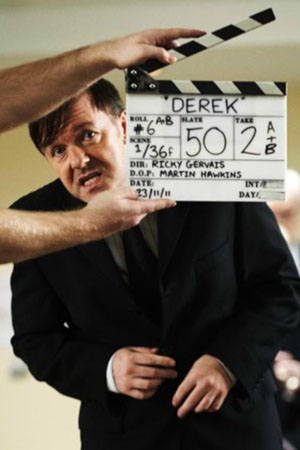“If I were clever enough to understand this piece, I think I’d love it,” Ricky Gervais tweeted on Friday. The piece, “Ricky Gervais and Michael Haneke: Together at Last,” had appeared earlier that day at Critical Studies in Television. What Jason Jacobs argues is that Gervais’s series Derek and Haneke‘s Amour are both “withering in their depiction of those who flinch from the nature of caring for the old and frail.” Via Catherine Grant.
“Nathaniel Dorsky‘s website has moved, and brings news of a recently completed film, Song, to be projected in San Francisco and Paris in May.” And that’s just the first of a good handful of noteworthy items Matthew Flanagan‘s recently gathered.
Interiors has a new site and Adrian Martin alerts us to the essays in English on Brazilian cinema at Cinética. At Making Light of It: “Bruce Conner and the Compilation Narrative.”
David Bordwell considers the ways in which Lasse Hallström’s Safe Haven and Steven Soderbergh’s Side Effects are heirs of the tradition of the 1940’s-era suspense thriller.
Carson Lund in the Notebook: “Confined entirely to the space of a single nondescript room in Weimar-era Germany yet surprisingly and exhilaratingly expansive, [Romuald Karmakar’s The Deathmaker (1995)] constitutes a diverse set of interrogations into what it means to know, what can be known, different types of knowledge, and the depths of human behavior that knowledge actually complicates and obfuscates rather than illuminates.”
For Artinfo, Scott Indrisek talks with Aïda Ruilova about her exhibition I’m So Wild About Your Strawberry Mouth, on view at Kayne Griffin Corcoran in Los Angeles through May 4 and featuring “a new video work with the film director Abel Ferrara as its subject, a series of drawings executed on movie posters from the erotic Emmanuelle films, as well as her first sculptural work to date.” Via Movie City News.
For those who read Spanish, Miguel Gil and Cloe Masotta Lijtmaer have interviewed Anne Wiazemsky for Transit.
In other news. Miguel Gomes (Our Beloved Month of August, Tabu) will be the President of the Jury of the Nespresso Grand Prize for La Semaine de la Critique (Critics’ Week).
The lineup for Ebertfest 2013 (April 17 through 21) is set—and looks terrific. Tilda Swinton will be on hand for a screening of Erick Zonca’s Julia (2008) and Jack Black and Richard Linklater will present Bernie (2011).
At Cineuropa, Bénédicte Prot lists the nominations for the Lolas, the German Film Academy’s version of the Oscars. Cloud Atlas leads with nine, followed by Jan Ole Gerster’s Oh Boy with eight and Margarethe von Trotta‘s Hannah Arendt with six.
TV. Last night, HBO premiered Phil Spector, written and directed by David Mamet and starring Al Pacino as the legendary “Wall of Sound” songwriter and producer and Helen Mirren as his lawyer. “It is a drama inspired by actual persons on a trial,” HBO emphasizes, “but it is neither an attempt to depict the actual persons, nor to comment upon the trial or its outcome,” which, to Jim Emerson‘s ears, “sounds a little like one of Mamet’s nonsensical latter-day post-right-wing conversion rants.” Reviews are plenty—see, for example, Jason Bailey (Flavorwire), Josh Bell (Las Vegas Weekly), Roger Ebert (Chicago Sun-Times), Owen Gleiberman (Entertainment Weekly), Jason Gorber (Twitch), David Hadju (New Republic), Troy Patterson (Slate), Nathan Rabin (AV Club, B), Matt Zoller Seitz (New York), Alessandra Stanley (New York Times), and Alison Willmore (Indiewire)—but John Semley might well have nailed it in Slant: “As written and directed by Mamet, never shy about his exceptionalist view of Jewish identity, the sympathy the film affords to Spector scans as suspect.”
Press Play VIDEO ESSAY – Pacino: Full Roar from Nelson Carvajal on Vimeo.
More interesting than Phil Spector as an event, though, is what Al Pacino is up to and how his performance here relates to his body of work overall. Karina Longworth, whose book Anatomy of an Actor: Al Pacino will appear in May, wonders in Slate, “Is Pacino consciously going through the motions of past performances, rehearsing the vocal tics and the staccato conductor’s hands, because like a dinosaur rock band on their umpteenth reunion tour, he thinks we came to see the greatest hits? Or is he just being realistic about being a relic?”
New York. “In New Inquiry and Spectacle Theater‘s ongoing series, Film as a Subversive Art, we’ve been looking at movies culled from Amos Vogel’s book of the same name. This month, we’ll be diving into his section titled ‘Trance and Witchcraft.'” Tonight.
In the L, Aaron Cutler recommends tomorrow evening’s double bill at Light Industry, Hollis Frampton’s Poetic Justice (1972) and Beatrice Gibson’s The Tiger’s Mind (2012).
In the works. Olivier Assayas will shoot Sils Maria in English in German and Switzerland this summer, reports Ioncinema‘s Eric Lavallee. Juliette Binoche will play “a famous actress named Maria Enders,” and Mia Wasikowska has been cast as an assistant.
Binoche has also lined up a Godzilla movie of all things, reports Robert Michael Poole at Artinfo. Gareth Edwards will direct and Ken Watanabe will co-star.
Gerardo Naranjo (Miss Bala) is currently developing The Mountains Between Us and will also take over a remake of the late Michael Winner‘s Death Wish (1974) from Joe Carnahan. Justin Kroll reports for Variety.
Viewing. Film.com presents the “50 Best Opening Scenes of All Time.”
More viewing (4’26”). Roberto Amaba‘s “Mitochondrial Eve” is composed of passages from Bresson’s Mouchette (1967), Tsukamoto’s Kotoko (2011), Lynch’s Eraserhead (1977), the Lumières‘ Baby’s Lunch (1895).
More browsing? John Wyver‘s got another fine collection of links.
For news and tips throughout the day every day, follow @KeyframeDaily on Twitter and/or the RSS feed. Get Keyframe Daily in your inbox by signing in at fandor.com/daily.




